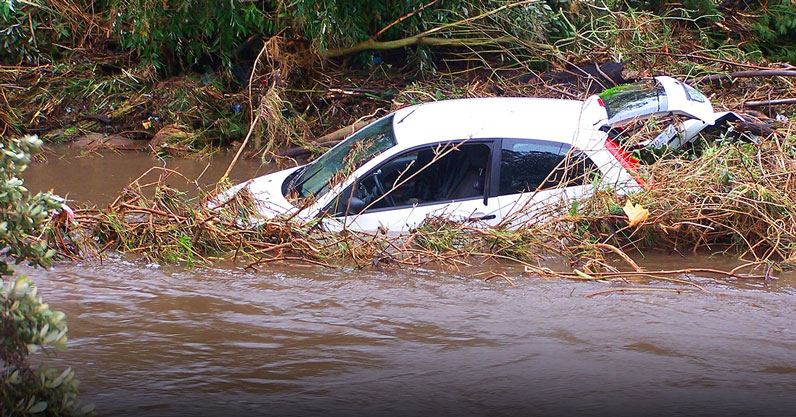Many homeowners who face a residential insurance claim want to know what constitutes an “act of God” insurance claim and how it affects their policy coverage. An act of God is an event that happens as a result of natural causes. It is an uncontrollable and unpreventable event. Such events can be in form of tornadoes, hurricanes, earthquakes, hailstorms, etc. Most people think that insurance providers use the clause “Act of God” to avoid paying insurance claims. But how true is it? You’ll find out in this article.
What is an Act of God?
These are natural occurrences and situations that are beyond a person’s control. However, not every natural disaster is covered by every homeowner’s insurance policy. For example, if people reside in a flood zone or in an earthquake or hurricane-prone area, their insurance policy may prohibit coverage in those scenarios. Homeowners can frequently obtain a separate insurance policy to cover those exclusions at that time.
In terms of insurance, an Act of God is a natural occurrence that could not have been predicted or averted. It defines an event:
- In which no one can be held accountable.
- That could not possibly have been avoided.
- Natural causes were directly responsible.
Floods, lightning storms, hail, tornadoes, and earthquakes are examples of Acts of God.
Origin of Act of God
Act of God is a legal term that originated in Roman law. It first appears in English judgments about the 16th century. It allowed someone to be excused from appearing in court if a ‘superior force’ prevented them from doing so.
Eventually, it made its way into insurance law. This was evidenced by a judicial judgement published in the Times in 1803. It states that, ‘by Common Law, Carriers are insurers against every loss of goods entrusted to their care, except losses occurring from the Act of God, or the King’s adversaries.’
Insurance firms nowadays prefer not to rely on a word as broad as Act of God. Instead, policies include a list of explicit exclusions that should make it clear what is and is not covered. If anything unexpected happens to you and your claim fits all other policy terms and conditions, the insurer will pay out.
It’s a good idea to review the policy and remind yourself of the exclusions. Call your provider and ask them to route you through them.
Insurance companies that refuse or undervalue your claim based on the phrase “Act of God” are sometimes merely trying to confuse matters so they can avoid paying the full claim of your claim. If your insurance provider is giving you the runaround, delaying or denying your natural catastrophe claim, you should seek legal counsel.
If your insurance policy does not specify what constitutes an act of God, it may be up to interpretation.
What Isn’t an Act of God?
Anything that was caused by a person or that could have been reasonably expected, protected against, and/or prevented. An unintentional fire in your home, for example, is not regarded an Act of God. This so since it might have been averted, maybe by greater craftsmanship when the house was built or through better fire safety.
Some of the misunderstandings regarding Act of God clauses may arise from a related legal notion known as force majeure. These clauses are commonly seen in commercial contracts as a form of insurance against unforeseen events.
For example, if a corporation did its hardest to deliver products or services but was unable to do so due to circumstances beyond its control – such as a virus outbreak or a volcano erupting – it may declare force majeure and (hopefully) avoid being sued for breach of contract.
Examples of Acts Of God

The NBA has an act of God clause, as do many other sports and entertainment contracts. The contract specifically addresses events such as a pandemic. According to the contract, a portion of the players’ salary might be deducted for each canceled game caused by the occurrence.
An act of God clause in a contract, on the other hand, does not mean that no one is accountable for damages.
A natural calamity, such as a flood or an earthquake, is rarely predictable or avoidable. Importantly, the insured cannot use the event as an excuse to not take reasonable precautions to prevent or mitigate damage.
Assume a damaged warehouse crashes during an earthquake, injuring onlookers. The building’s collapse, according to the owner, was caused by an act of God. However, the insurer will almost certainly refuse the claim. And, there may be no legal recourse because the owner failed to take reasonable care to maintain the structural integrity of the structure.
Similarly, governments must take reasonable precautions to avoid calamities. Assume a state fails to maintain a dam, which bursts and causes significant harm to a town. This is not a supernatural occurrence. Although heavy rains led bodies of water to expand, the flooding was caused by the government’s failure to maintain water retention systems.
Is An Act Of God Claim Covered by auto insurance?
Under comprehensive coverage, automobile insurance often includes coverage for act of God. Comprehensive coverage is an optional extra. It covers damage to your car caused by anything other than an accident. These include vandalism, fire, and terrorism, in addition to acts of God. So, if you have comprehensive coverage on your auto insurance policy, you are protected from natural catastrophes and other unforeseeable events.
Remember that insurers will look for other causes of damage before paying out under comprehensive coverage.
For example, if a tree on your property is blown over and falls on your car during a storm, you’re protected. However, if it turns out that your tree was rotten and should have been removed, you may not be compensated for the damage because your negligence was a contributing factor.
Does Homeowners Insurance Cover an Act Of God Claim?
Coverage for act of God under homeowners insurance is tricky. Again, the clause “act of God” is not used in home insurance policies to designate a protected category. Certain natural calamities are covered by homes insurance, while others are not. Wind, rain, and hail damage are typically covered under regular homeowner policies. Damage from earthquakes, volcanoes, and floods, on the other hand, isn’t.
The only way to know for sure whether you’re protected against a certain type of damage is to thoroughly study your policy and, if necessary, ask your insurance agent for clarification.
Furthermore, the sort of homes insurance policy you have will determine which types of harm you are insured for. The most common sort of homeowners insurance, known as HO-3, covers the structure of your home against all perils save those specifically excluded. If you have a more limited policy, such as HO-1 or HO-2, you are only protected for the risks listed in your policy and nothing else.
Some acts of God, such as wind, lightning, and hail, are covered by all forms of homeowners policy. Similarly, some events, such as earthquakes and floods, are excluded from all policies. However, there are some distinctions. For example, HO-1 policies do not cover snow weight damage, whereas HO-2 and HO-3 policies do.
Finally, if you are insured for natural catastrophes, insurance firms may look to other possible causes of damage to evaluate whether or not to pay for the loss.
Is Acts of God Car Insurance Covered for Volcanic Eruption?
Any volcano eruption act of God insurance claim is legitimate if the coverage is covered in your policy. You simply need to provide evidence that the car damage was caused by the volcanic eruption. You should also make certain that you have not been negligent in protecting your automobile. Then, submit the standard documentation needed to file a car insurance claim.
Why Should I Invest in Acts of God Insurance?
Although some insurance companies offer unique policies with acts of God insurance, you can still get it as an add-on to your car insurance. This may necessitate a more expensive policy, but a few extra dollars won’t harm. You can get the following benefits if you have act of God insurance coverage:
#1. Repairs reimbursement
If your vehicle receives natural disaster damage, such as a clogged air-filtration system due to an ashfall, your auto insurance carrier will take care of the repairs by reimbursing you for the costs.
#2. Compensation for Totaled Vehicles
Because acts of God insurance entitles you to a pay in return for your damaged car, insurers will thoroughly investigate your claim. Please keep in mind that the payment will be based on the current market value of your vehicle, not the original purchase price.
#3. Peace of Mind
Having automobile insurance gives you the assurance that your insurer will assist you in covering the costs if your vehicle is damaged or stolen. When you know your car is secure, you can concentrate on your family’s protection in the event of a natural disaster.
How can I be sure I’m protected?
In many regions of the world, the weather is simply referred to as “weather”. Acts of God cost US insurers $25 billion in 2014. And UK weather patterns are shifting as well, with flood damage, in particular, costing billions of pounds.
Flood Re was founded in 2016 by the United Kingdom, the insurance sector, and the government. This is referred to as a reinsurance program. It essentially protects insurance firms against large flood-related losses. Thus, allowing them to offer competitive insurance plans to consumers whose properties are at high risk of flooding.
A storm that produced golf-ball-sized hailstones, as occurred in the East Midlands in 2012, caused millions of pounds in damage to cars and houses. That could be deemed an Act of God, but it is actually a weather occurrence covered by both auto and home insurance.
Is Deer Accident Considered an Act of God?
Deer accidents are commonly misunderstood as “Acts of God,” indicating that any deductible is waived by an insurance provider. There is even talk of the state refunding your deductible. That is not the situation in reality. As with any other peril, never assume that an insurance provider would waive a deductible or that your government will cover the expense. It all depends on how your insurance policy is worded and what coverage you purchase.
Each state is different, but the minimum coverage required by law may not cover losses caused by a deer accident. Many states require liability coverage for drivers, but not all need comprehensive coverage, which often covers such claims. It could assist you in repairing or replacing your vehicle if it has been damaged by a deer. Comprehensive coverage protects you from damage caused by seemingly random or unpredictable events, like colliding with a deer that rushes out in front of your vehicle.
In Conclusion,
There are a few things you may do on your own to protect your home from potential storm damage. The easiest method to ensure you’re insured for so-called Acts of God is to carefully review your policy before purchasing. If you discuss your situation with your provider, they will work with you to determine whether you are eligible for coverage.
Act Of God Insurance FAQs
What kind of insurance policy covers Act of God?
Comprehensive auto insurance often covers acts of God such as hurricanes, lightning strikes, earthquakes, and other natural disasters.
What is an insurance definition of an Act of God?
In insurance, an act of God is defined as an act of nature that couldn’t have been predicted, or prevented, and for which no human is to blame.






